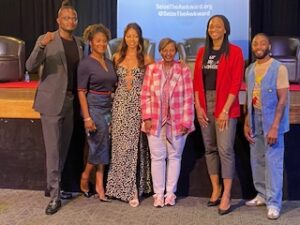Cyberbullying Resources for Parents and Caregivers
As caring and supportive adults, we aspire to guide youth toward becoming compassionate, understanding, and resilient individuals. In a world where social and emotional challenges ...

When Camille Hyde from The CW’s “All American: Homecoming” spoke to a crowd of Clark Atlanta University students last month, she said: “I’m here because—simply—life is very short, and I want all of you guys to enjoy it.”
Hyde appeared alongside other leaders in storytelling, advocacy, and Black mental health on April 21 to launch Seize the Awkward’s collegiate conversations series: “Let’s Talk: College Edition.” Seize the Awkward, developed by the American Foundation for Suicide Prevention and The Jed Foundation (JED), in collaboration with the Ad Council, offers tips and resources to help young adults start a conversation with friends who may be struggling with their mental health.
Hosted by the Atlanta University Center Consortium and historically Black college and university (HBCU) member institutions—including Morehouse College (a JED Campus), Clark Atlanta University, Morehouse School of Medicine, and Spelman College—the event focused on normalizing help-seeking in the Black community. Speakers explained how students can take care of themselves, and each other, by reaching out for help when it’s needed.
Surrounded by his brothers from Kappa Alpha Psi, Frankie Caloum, a senior at Clark Atlanta who plans to be a therapist, said he was there “because people need to come together and learn how to talk to their counselors” and “talk about their feelings on their own time, too.”
This goal was emphasized by organizer Darryl B. Holloman, PhD, Vice President for Student Affairs at Spelman College, when he took the stage. “Growing up, we didn’t talk about this, because African Americans were not given the space to talk about mental health,” he said. “We come together today to give you that space.”
The event was joyful—with a DJ, a photobooth, and a live musical performance—and several of the panelists shared serious stories from their own lives, including Shanti Das, a former record industry executive. Das said that she lost her father to suicide when she was seven years old. As an adult, she walked away from the record industry at the height of her career—after helping launch Usher and OutKast—to take care of herself. But she fell into a “downward spiral” and came close to “taking [her] own life.”
Das shared that she opened up to her pastor and her sister who both encouraged her to get help, which she did, and then she went on to found Silence the Shame, a nonprofit “dedicated to eliminating mental health stigma, reducing health disparities, and improving rates of suicide among vulnerable populations.” She told the gathered students, “We are out here to let you know that we see you, we hear you, we feel you, and you need to honor your feelings.”
Susanna Major, a junior at Spelman College, was there because one of her professors, who knew she had struggled with depression, told her about the event. “I know how isolating it can be to not be able to get up in the morning,” said Major, who said she came to the event to “be in fellowship and in community, to know we’re not alone.”
Khadijah Booth Watkins, MD, MPH, a JED Advisory Board member and Associate Director of the Clay Center for Young Healthy Minds at Mass General Hospital in Boston, talked about the power of connection and urged the students to “take stock of who you surround yourself with, because connections are important, but good connections are more important.”
A recurring theme involved setting boundaries and prioritizing your own emotional well-being.
Wisdom O. Cole, National Director of the NAACP’s Youth and College Division, said: “As a Black student, you have to work twice as hard to get half as far as your colleagues across the country. You have family that are counting on you to make it, and that pressure can be daunting.”
“The discrimination we face in the world is contributing,” said Cole, “but we don’t have to sacrifice ourselves for the greater good. You can’t give to others unless you are pouring into yourself.”
Shalondan Hollingshed, Young Professional President of the National Urban League, added: “Identify your non-negotiables. If you have things that give you peace and keep you centered—whether it’s exercise, meditation, reading a book—say ‘I cannot take these off my plate.’”
Other advice from the panelists included:
The crowd came to its feet at the end when Hasani Vibez, a Morehouse senior, performed an original song about recovering from hardship. A dedicated athlete, Vibez suffered a knee injury in high school and thought he might never walk again. But Morehouse College showed that it had faith in him, which restored his faith in himself. While still injured, he was awarded a football scholarship that motivated him to stay strong through his healing journey.
“Embrace yourself, don’t hate yourself,” sang Vibez, getting the students to join in: “You have to love yourself, before you love anybody else.”
The crowd came to their feet and sang this refrain with Vibez, a beautiful moment of connection and self-compassion that we hope will echo throughout the remainder of Seize the Awkard’s conversation series on campuses and online. To learn more about Seize the Awkward and how to start life-changing conversations, visit SeizeTheAwkward or follow @SeizeTheAwkward on Instagram.
If you or someone you know needs to talk to someone right now, text, call, or chat 988 for a free confidential conversation with a trained counselor 24/7.
You can also contact the Crisis Text Line by texting HOME to 741-741.
If this is a medical emergency or if there is immediate danger of harm, call 911 and explain that you need support for a mental health crisis.